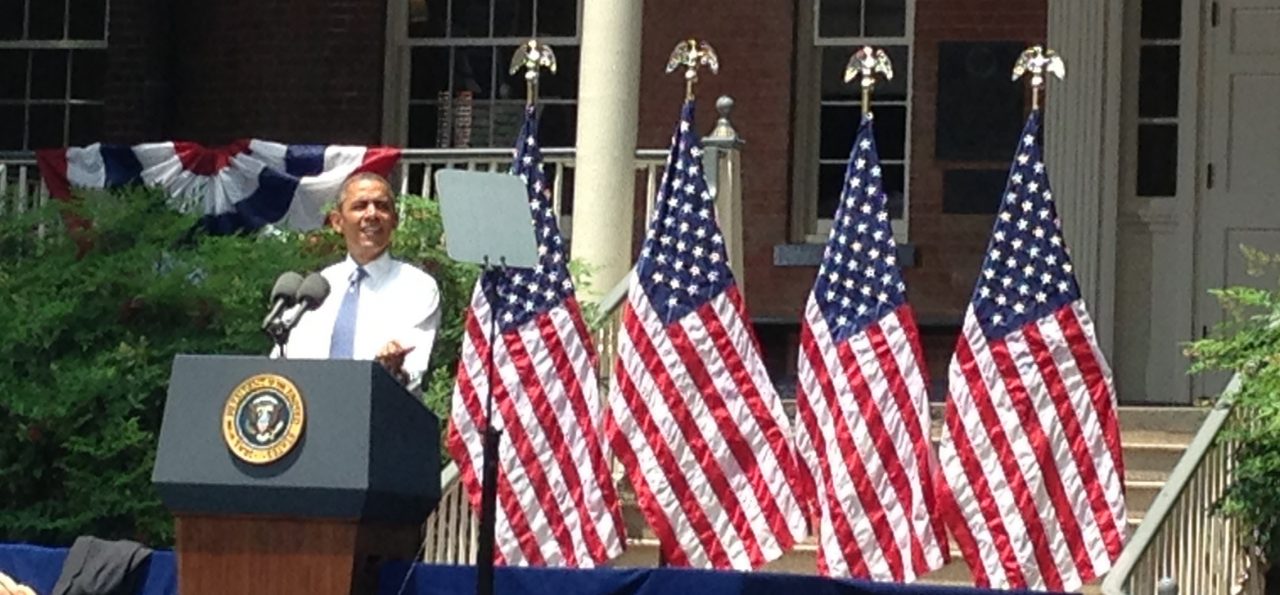Look who we spotted in Washington! Tim Profeta, Director of the Nicholas Institute for Environmental Policy Solutions, stopped by the Duke in Washington office on Tuesday and gave us this update on his activities in and around the Capitol City.
CC: What brought you to Washington, D.C., this week?
Tim Profeta: I came to attend President Obama’s speech on climate change at Georgetown University. Prior, I met with the Senate Agriculture Committee about whether the Institute’s nascent project to reduce nutrient runoff from agricultural lands could inform their legislative efforts, and with the Senate Environment and Public Works Committee to help them interpret the President’s imminent comments based on our work under the Clean Air Act.
CC: What’s the significance of President Obama’s remarks?
Tim: Jonas Monast, Director of the Climate and Energy Program at the Nicholas Institute, and I answer this question (and more!) in an analysis for the Bulletin of the Atomic Scientist, “Obama’s Pragmatic Climate Change Speech.”
CC: How has the Nicholas Institute contributed to the climate change conversation over the years? How do you hope to continue to be a part of the conversation?
Tim: I think it is fair to say the Nicholas Institute has been intimately involved in the climate policy debate, in all stages of its evolution, since our launch in 2005. Going forward, we will be immediately engaged with stakeholders and government officials to help analyze and evaluate efforts to execute the President’s plan, with a non-exclusive focus on efforts to regulate existing sources under the Clean Air Act.
In particular, we will be running a public stakeholder workshop, jointly with the Georgetown Climate Center, on the EPA’s options to implement such existing source regulations out of Duke’s Washington, D.C. office July 23. We also have several private forums planned over the next few months that will allow more candid feedback from those stakeholders on the President’s options. One of these meetings will build on work released this month identifying how potential regulatory tools under the Clean Air Act–beyond greenhouse gas rules–could accelerate development and deployment of potentially game-changing clean air and energy technologies to reduce emissions in the nation’s key industrial sectors.
Finally, our modeling teams are working over the summer to provide economic analyses of alternative policy approaches that could be taken by the President under the Clean Air Act.
CC: What was going through your mind as you listened to the President’s announcement?
Tim: I was evaluating the political response – Republican Senator John Barrasso lambasted the EPA as “arrogant or ignorant” as the speech occurred – and the pragmatic steps that could be taken to meet the challenge the President identified in a way that would work environmentally, economically, and politically. And I started planning what Duke could do to help find solutions to these problems.
I also was thinking about just how hot it was! I picked up my iPhone for a planned press call immediately after the speech’s conclusion to discover I was unable to use it because it had overheated. So perhaps a new impact of climate change is the inability to access our Apps?!?
